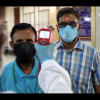Should You Get The Shot?

Vaccines have abolished debilitating illnesses like polio and smallpox. According to the WHO, global vaccinations prevent around 4 to 5 million deaths per year. An additional 1.5 million deaths can be avoided if global vaccinations improve in the future.
Despite knowing how important vaccination campaigns are, people tend to put off getting vaccinated.
No one has fond memories of getting jabbed in the arm with a long, thin needle. Pain experienced after getting an injection is nothing compared to the breathlessness due to Covid-19 infection. It definitely beats getting hospitalised and it is the least you can do to protect yourself and your family.
The biggest concern related to the vaccines available is the efficacy rate. The Pfizer-BioNTech vaccine had a 95 percent efficacy rate against the first strain of Covid-19 while the Oxford/AstraZeneca one had a 79 percent efficacy rate.
Does that mean that Pfizer is better than AstraZeneca?
Efficacy rates depend on the timing and location of the clinical trial. Pfizer and Moderna trials took place mostly in the US before the appearance of more contagious strains. Whereas other vaccines were tested in Asia and Africa when infection rates started climbing higher. It is not sensible to compare different vaccines since their trials took place under different circumstances.
An efficacy rate of 95 percent does not mean that five in a hundred people will get sick after vaccination. Instead, it means that compared to an unvaccinated person, someone who is vaccinated is very, very less likely to become infected when they are exposed to the contagion.
Vaccines are not invincible. It is possible to get infected even if you are vaccinated. However, most vaccines are 100 percent effective against moderate to severe infections. Vaccination significantly raises the odds of surviving Covid-19 and reduces the chances of getting hospitalised.
Another reason why people are still afraid is the side effects associated with vaccines. One should not be alarmed by mild fevers and aches after getting the shot. Your body is training its army of lymphocytes in preparation for a very likely encounter with the virus.
Less common side effects include anaphylaxis, which is treated with an injection of epinephrine. Even rarer side effects include rare blood clots associated with AstraZeneca's vaccine and myocarditis associated with mRNA vaccines. However, these side-effects are so rare that only a handful of cases are reported in a million doses administered.
As Covid-related mortalities climb higher each day, it is important now more than ever to get vaccinated. Get your papers in order. Register for a vaccine if you are eligible. Encourage people to get vaccinated, and help them through the registration process. The faster we contain the virus, the sooner everything returns to normal.
References
1. WHO (December 5, 2019). Immunization.
2. Vox (March 20, 2021). Why you can't compare Covid-19 vaccines.
3. Yale Medicine (July 29, 2021). Comparing the COVID-19 Vaccines: How Are They Different?
Subah is an average science nerd. Contact her on Twitter @hussain_subah

 For all latest news, follow The Daily Star's Google News channel.
For all latest news, follow The Daily Star's Google News channel. 








Comments